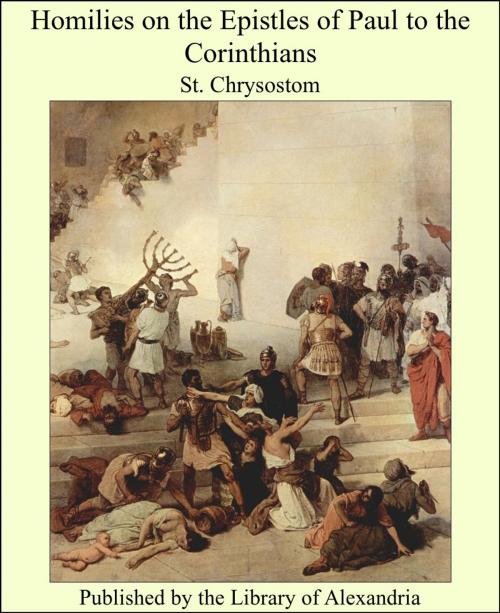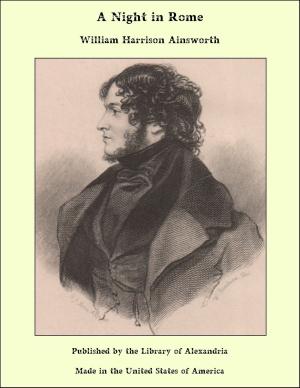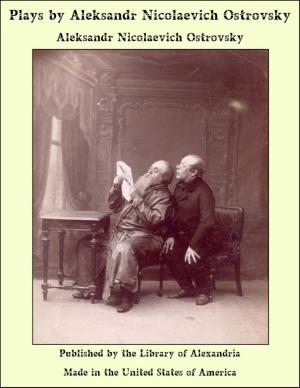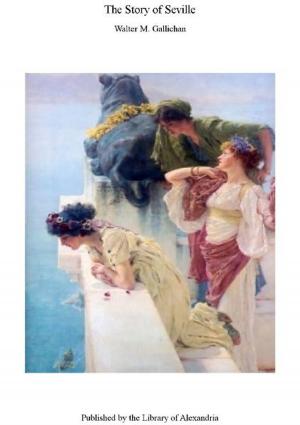Homilies on the Epistles of Paul to the Corinthians
Nonfiction, Religion & Spirituality, New Age, History, Fiction & Literature| Author: | St. Chrysostom | ISBN: | 9781465541048 |
| Publisher: | Library of Alexandria | Publication: | March 8, 2015 |
| Imprint: | Language: | English |
| Author: | St. Chrysostom |
| ISBN: | 9781465541048 |
| Publisher: | Library of Alexandria |
| Publication: | March 8, 2015 |
| Imprint: | |
| Language: | English |
The British edition of this translation has a preface in which is given a short “sketch” of Chrysostom’s history. As a fuller outline has been given in the course of the present reproduction of the homilies, it is considered advisable to omit this sketch here. (See Vol. ix. pp. 323.) The remainder of the English editor’s preface is as follows: another reason undoubtedly is the remarkable energy and fruitfulness of the writer’s mind, that command of language and of topics, and above all, that depth of charitable and religious feeling, which enabled him, to a very remarkable extent, to carry his hearers along with him, even when the things he recommended were most distasteful to their natures and prejudices. It is obvious how much of the expression of this quality must vanish in translation: the elegance and fluency of his Greek style, the flow of his periods, the quickness and ingenuity of his turns, all the excellencies to which more especially his surname was owing, must in the nature of things be sacrificed, except in case of very rare felicity, on passing into a modern language. His dramatic manner indeed, which was one of the great charms of his oratory among the Greeks, and his rapid and ingenious selection and variation of topics, these may in some measure be retained, and may serve to give even English readers some faint notion of the eloquence which produced so powerful effects on the susceptible people of the East. iv “Again, this profusion of literary talent, and eloquency and vehemence and skill in moral teaching, is of itself, as human nature now exists, a matter of much jealousy to considerate persons, found answerable to the profession implied in their works. And therefore it was desirable to dwell on it in this instance, for the purpose of pointing out afterwards how completely his life gave evidence that he meant and practiced what he taught. “The Homilies on the first Epistle to the Corinthians have ever been considered by learned and devout men as among the most perfect specimens of his mind and teaching. They are of that mixed form, between exposition and exhortation, which serves perhaps better than any Other, first, to secure attention, and then to convey to an attentive hearer the full purport of the holy words as they stand in the Bible, and to communicate to him the very impression which the preacher himself had received from the text. Accordingly they come in not unfitly in this series, by way of specimen of the hortatory Sermons of the ancients, as St. Cyril’s, of their Catechetical Lectures, and St. Cyprians, the Pastoral Letters, which were circulated among them
The British edition of this translation has a preface in which is given a short “sketch” of Chrysostom’s history. As a fuller outline has been given in the course of the present reproduction of the homilies, it is considered advisable to omit this sketch here. (See Vol. ix. pp. 323.) The remainder of the English editor’s preface is as follows: another reason undoubtedly is the remarkable energy and fruitfulness of the writer’s mind, that command of language and of topics, and above all, that depth of charitable and religious feeling, which enabled him, to a very remarkable extent, to carry his hearers along with him, even when the things he recommended were most distasteful to their natures and prejudices. It is obvious how much of the expression of this quality must vanish in translation: the elegance and fluency of his Greek style, the flow of his periods, the quickness and ingenuity of his turns, all the excellencies to which more especially his surname was owing, must in the nature of things be sacrificed, except in case of very rare felicity, on passing into a modern language. His dramatic manner indeed, which was one of the great charms of his oratory among the Greeks, and his rapid and ingenious selection and variation of topics, these may in some measure be retained, and may serve to give even English readers some faint notion of the eloquence which produced so powerful effects on the susceptible people of the East. iv “Again, this profusion of literary talent, and eloquency and vehemence and skill in moral teaching, is of itself, as human nature now exists, a matter of much jealousy to considerate persons, found answerable to the profession implied in their works. And therefore it was desirable to dwell on it in this instance, for the purpose of pointing out afterwards how completely his life gave evidence that he meant and practiced what he taught. “The Homilies on the first Epistle to the Corinthians have ever been considered by learned and devout men as among the most perfect specimens of his mind and teaching. They are of that mixed form, between exposition and exhortation, which serves perhaps better than any Other, first, to secure attention, and then to convey to an attentive hearer the full purport of the holy words as they stand in the Bible, and to communicate to him the very impression which the preacher himself had received from the text. Accordingly they come in not unfitly in this series, by way of specimen of the hortatory Sermons of the ancients, as St. Cyril’s, of their Catechetical Lectures, and St. Cyprians, the Pastoral Letters, which were circulated among them















